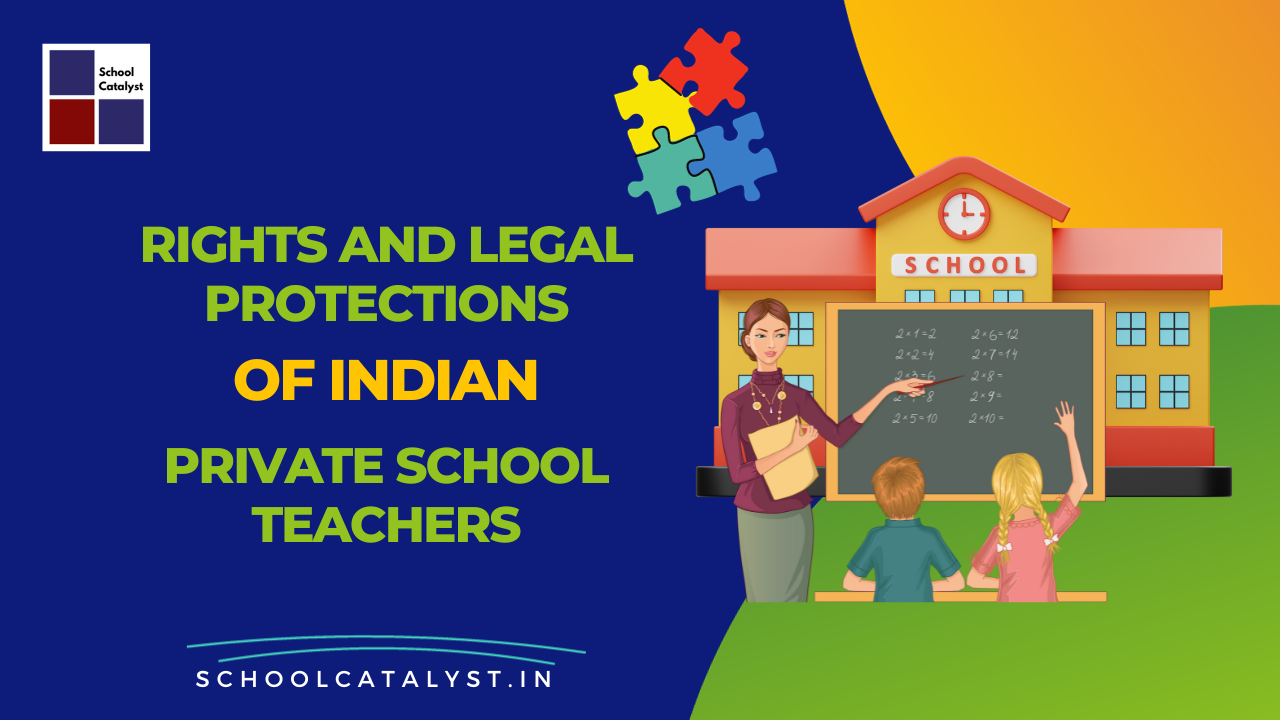The Rights and Legal Protections of Indian Private School Teachers

Table of Contents
Introduction:
Private school teachers in India are the backbone of our education system, shaping the minds of future generations. However, despite their pivotal role, many teachers are unaware of their rights and legal protections. In this comprehensive guide, we will look into the essential aspects of the rights and legal safeguards available to Indian private school teachers, including their payment rights.
1. Employment Contracts and Salary Terms:
One of the fundamental elements in the life of a private school teacher is their employment contract. It is imperative to have a written contract that outlines the terms of employment, including salary details, working hours, and other relevant clauses. It is within this contract that the foundation for your payment rights is laid.
2. Salary and Benefits:
Private school teachers have the right to receive fair and timely payment for their services. The Payment of Wages Act, 1936, governs the disbursement of wages, ensuring that the salary is paid regularly and on time. Additionally, your contract should clearly specify your salary, allowances, and any other benefits you are entitled to.
3. Deductions and Taxation:
It is essential to be aware of any deductions that may be made from your salary, such as provident fund contributions or income tax. These deductions must be in accordance with the applicable laws, and your employer should provide transparency regarding the details of these deductions.
4. Leaves and Holidays:
Private school teachers are entitled to various types of leaves, including sick leave, casual leave, and earned leave. It is essential to understand the conditions under which these leaves can be availed, as well as the process for requesting them. Additionally, your right to public holidays and vacations is protected by law.
5. Job Security:
The fear of job insecurity can be a significant concern for many teachers. The Industrial Disputes Act, 1947, lays down provisions for protecting employees’ rights in cases of termination or retrenchment. It is crucial to understand the legal safeguards in place and the process to challenge wrongful terminations.
6. Harassment and Discrimination:
As a private school teacher, you have the right to work in a safe and respectful environment. The Vishakha Guidelines mandate the prevention of sexual harassment at the workplace. If you ever encounter harassment or discrimination, you should be aware of the legal recourse available to you.
7. Professional Development and Certification:
To excel in your career as a teacher, continuous professional development is vital. Understand your right to attend workshops, seminars, and training sessions provided by your school. Moreover, teacher certification and upskilling are integral aspects of career growth.
8. Unions and Associations:
Teachers’ unions and associations play a significant role in protecting the rights and interests of teachers. It is worth exploring the possibility of joining or forming such groups, as they can be a powerful voice in safeguarding your rights.
9. Legal Recourse:
If your rights are ever violated, it is essential to know the legal recourse (having to use something or ask somebody for help in a difficult situation) available. This may involve filing complaints with the Labor Commissioner or even pursuing legal action in the courts. Seek legal advice when necessary to protect your rights.
FAQs
Can my employer hold my salary?
Your employer should not arbitrarily hold your salary. The Payment of Wages Act, 1936, mandates timely and full payment of wages. If there are legitimate reasons for any deductions, they should be transparent and in compliance with the law.
What should I do if I don’t receive my salary on time?
If you face delays in receiving your salary, you should first communicate with your employer and request timely payment. If the issue persists, you can file a complaint with the Labor Commissioner or approach the appropriate legal authority for resolution.
Can my employer make deductions from my salary without my consent?
Deductions can be made from your salary for specific purposes like provident fund contributions or income tax. However, these deductions should adhere to legal regulations, and your consent is not required for such statutory deductions
What are my rights if I’m terminated without just cause?
The Industrial Disputes Act, 1947, provides protection against wrongful termination. If you believe you’ve been terminated without just cause, you have the right to challenge it through legal channels and seek reinstatement or compensation.
How can I address workplace harassment or discrimination?
If you experience harassment or discrimination at your workplace, you have the right to file a complaint under the Vishakha Guidelines. Consult with your school’s Internal Complaints Committee (ICC) or take legal action as necessary.
Are there any legal provisions for professional development as a teacher?
Yes, you have the right to participate in professional development activities, workshops, and training. Your school should provide opportunities for skill enhancement and certification, which can further your career.
Can private school teachers join or form unions?
Yes, private school teachers can join or form teachers’ unions and associations. These organizations are instrumental in advocating for teachers’ rights and can provide support in various employment-related matters.
What if my employer refuses to grant me leaves or holidays as per the contract?
If your employer violates the terms of your employment contract regarding leaves and holidays, you have the right to raise the issue with your school’s management or approach the appropriate legal authority for resolution.
How can I stay updated on changes in labor laws and regulations affecting teachers?
To stay informed about recent developments and amendments, it’s advisable to regularly check government websites, attend seminars or webinars, and be a member of a teachers’ association that provides updates on legal changes.
Where can I seek legal advice or assistance if my rights are violated?
If your rights as a private school teacher are violated, you can seek legal advice from a qualified lawyer specializing in labor and employment law. They can guide you through the legal process and help protect your rights. Should you need further assistant you can contact us through our contact channels.
Upto how many days can a employer hold my salary?
Usually a employer cannot hold your salary withought a proper reason and notice, he should give you a proper notice for that. If you face delays in receiving your salary, you should first communicate with your employer and request timely payment. If the issue persists, you can file a complaint with the Labor Commissioner or approach the appropriate legal authority for resolution. This may be subject to a civil suit.
Knowledge is power, and knowing your rights as a teacher empowers you to be an effective educator while securing your well-being. For further assistant you can contact us through our contact channels.




